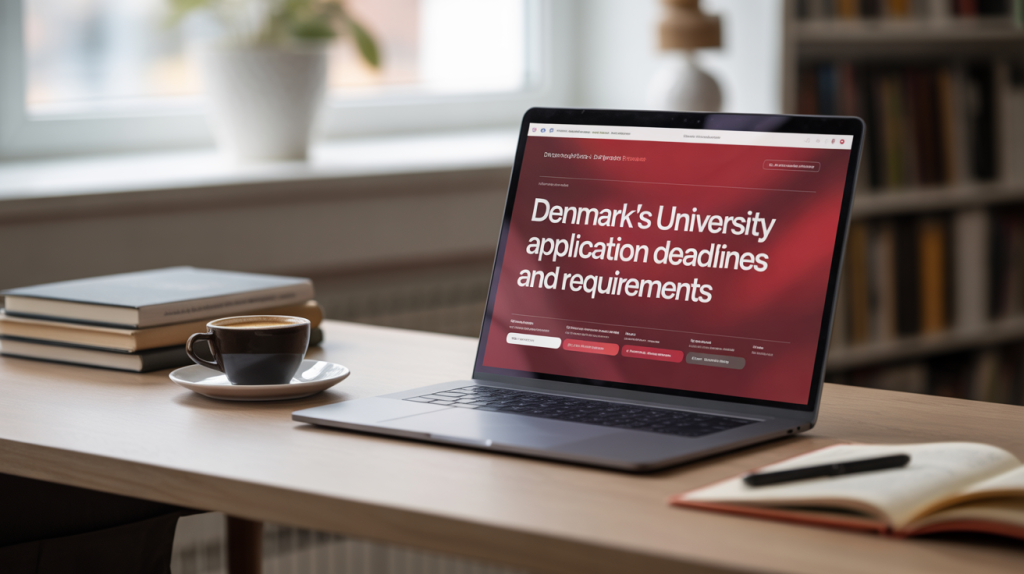A Comprehensive Guide to Denmark’s University Application Deadlines and Requirements
Understanding Application Deadlines
Denmark’s higher education system adheres to specific application deadlines, which must be respected by international students. Generally, there are two key application periods for university courses:
March Deadline (15 March, 12 noon CET)
The March deadline is particularly important for several categories of applicants:
- Quota 2 Applicants: This includes those applying under quota 2 provisions.
- International Upper Secondary Education Holders: Students with an International Baccalaureate (IB) diploma or equivalent, regardless of where they obtained it.
- Non-Danish Upper Secondary Qualifications: Applicants with qualifications from outside Denmark.
- Programs Requiring Admission Tests: Candidates looking to enroll in programs that require specific admission tests.
It’s noteworthy that applicants who submit their applications by the 15 March deadline may also be considered for quota 1 admission if their grades can be converted to the Danish 7-point grading scale. For those eyeing the 2024 intake, the deadline was set for March 15, 2024, at noon.
July Deadline (5 July, 12 noon CET)
The July deadline is essential for certain categories of applicants, particularly those who may not meet the criteria for the March deadline or who are seeking different courses. Similar to the March deadline, the application platform Optagelse.dk is utilized for submissions, which closes promptly at the stated deadline.
Key Milestones for September 2025 Intake
For students aiming for the September 2025 admission, here is a structured timeline to follow:
- Application Submission: January 2025
- Document Submission: February 2025
- Admission Results Release: April 2025
- Start of Classes: September 2025
It is imperative that candidates remain vigilant about these deadlines to secure their place in their desired programs.
Admission Requirements Explained
The admission requirements to Danish universities fundamentally differ based on the level of study. Below is a breakdown of the principal prerequisites for both Bachelor’s and Master’s programs.
Bachelor’s Programs
To enroll in a Bachelor’s program, candidates typically need to meet the following criteria:
- Educational Qualifications: Completion of high school or equivalent education with strong academic results.
- Subject-Specific Requirements: Some programs may have additional requirements concerning specific subjects. For example, engineering courses often require a mathematics background.
It is essential to thoroughly check individual program requirements as they can vary significantly.
Master’s Programs
Admission to Master’s programs requires a more advanced set of qualifications:
- Undergraduate Degree: Students must possess a completed undergraduate degree in a related field.
- Additional Criteria: Some Master’s programs might require specific GPAs or relevant work experience, so candidates should review the prerequisites for their chosen program closely.
English Proficiency
Most programs require proof of English language proficiency. Accepted tests include:
- IELTS
- TOEFL
Successful scores demonstrate applicants’ ability to participate fully in English-taught courses. Be sure to check your program’s minimum score requirements.
Popular Universities in Denmark
Denmark’s landscape features esteemed universities that offer diverse programs geared towards international students. Here are some notable institutions:
-
University of CopenhagenCopenhagenPrograms Offered: Arts, Social Sciences, Natural Sciences, Law
-
Aarhus UniversityAarhusPrograms Offered: Business, Engineering, Humanities
-
Technical University of Denmark (DTU)LyngbyPrograms Offered: Engineering, IT, Innovation
-
Copenhagen Business School (CBS)CopenhagenPrograms Offered: Business Administration, Economics
-
University of Southern DenmarkOdensePrograms Offered: Engineering, Health, Arts
These universities are renowned for their academic excellence and innovative research. Exploring their specific offerings can help you determine which aligns best with your professional and personal goals.
How to Apply
The application process is streamlined through the Optagelse.dk platform, where students can submit their applications electronically. Adhering to the specific deadlines is crucial, as late submissions will not be accepted.
Following Up on Applications
Responses to undergraduate applications are usually available by July 26. This timing is critical for planning any next steps, such as visa applications, accommodations, or financial arrangements.
Conclusion
Understanding Denmark’s university application deadlines and requirements is vital for prospective international students. By taking note of the crucial deadlines in March and July, preparing the necessary documentation, and demonstrating English proficiency, applicants can enhance their chances of admission to esteemed Danish universities.
At Study in Denmark, we specialize in guiding international students through every step of their application journey – from understanding deadlines to tailoring applications to maximize appeal. If you are a university admissions team, an international student recruiter, or an agency involved in student placements, we invite you to connect with us to explore partnerships and benefit from our comprehensive expertise in navigating the Danish education system. For more information or assistance in facilitating international student admissions, please reach out to us at Study in Denmark. We are here to help you succeed in bringing the best global talent to Denmark’s exceptional academic institutions.
Take the Next Step with Study in Denmark
Explore further to embark on your international education journey in Denmark. Discover more about the application process and requirements.




